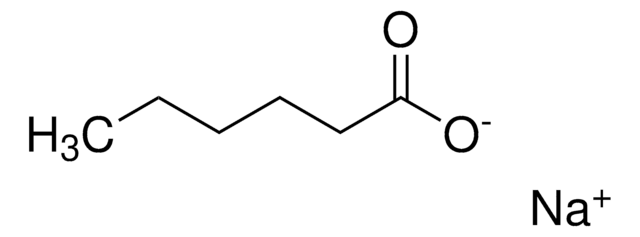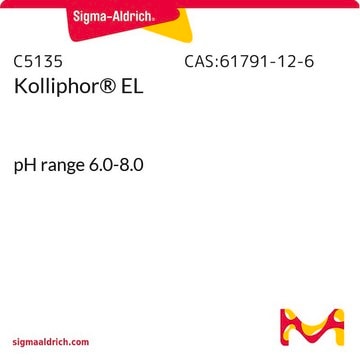L9755
Sodium dodecanoate
99-100%
Sinónimos:
Dodecanoic acid sodium salt, Lauric acid sodium salt, Sodium laurate
About This Item
Productos recomendados
biological source
synthetic
Quality Level
assay
99-100%
form
powder
functional group
ester
lipid type
saturated FAs
shipped in
ambient
storage temp.
room temp
SMILES string
[Na+].CCCCCCCCCCCC([O-])=O
InChI
1S/C12H24O2.Na/c1-2-3-4-5-6-7-8-9-10-11-12(13)14;/h2-11H2,1H3,(H,13,14);/q;+1/p-1
InChI key
BTURAGWYSMTVOW-UHFFFAOYSA-M
¿Está buscando productos similares? Visita Guía de comparación de productos
Categorías relacionadas
Application
signalword
Danger
hcodes
Hazard Classifications
Eye Dam. 1 - Skin Irrit. 2 - STOT SE 3
target_organs
Respiratory system
Storage Class
11 - Combustible Solids
wgk_germany
WGK 1
flash_point_f
Not applicable
flash_point_c
Not applicable
ppe
dust mask type N95 (US), Eyeshields, Faceshields, Gloves
Certificados de análisis (COA)
Busque Certificados de análisis (COA) introduciendo el número de lote del producto. Los números de lote se encuentran en la etiqueta del producto después de las palabras «Lot» o «Batch»
¿Ya tiene este producto?
Encuentre la documentación para los productos que ha comprado recientemente en la Biblioteca de documentos.
Los clientes también vieron
Nuestro equipo de científicos tiene experiencia en todas las áreas de investigación: Ciencias de la vida, Ciencia de los materiales, Síntesis química, Cromatografía, Analítica y muchas otras.
Póngase en contacto con el Servicio técnico













